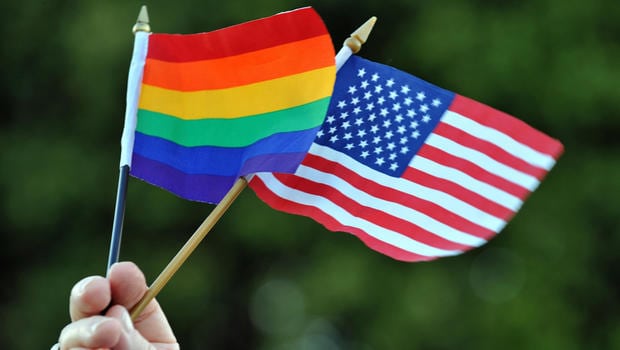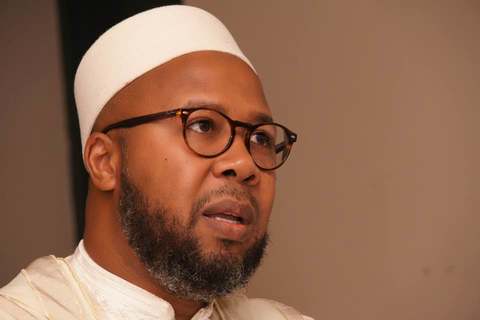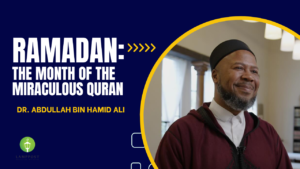No products in the cart.

“Islam, Arab Culture, and Black Identity: Dr. Abdullah bin Hamid Ali’s Response to Dr. Umar Johnson”
Dr. Umar Johnson is known for his controversial and perceived

by Abdullah bin Hamid Ali
In the name of Allah, Most Beneficent, Most Merciful
This missive is the result of many things: the most important of them was a call from a community leader friend of mine seeking guidance on how to appropriately respond to questions regarding the recent Supreme Court victory of the American homosexual lobby regarding same-gender marriage.
It was not so much that the Imam didn’t feel that his heart and thoughts were in the right place.
What was really of interest to him was finding the proper words to express what he already had the courage to say to his congregants and others.
He was not confused that there is something deeply wrong about homosexual attraction and the national legitimization of same-gender marriages.
He was, rather, uneasy about a few public responses made by certain Muslim leaders which he felt were almost too academic such that most readers, who typically like “black or white” answers, would find a hard time know exactly how to react to the supreme court verdict in spite of those attempts to offer direction to the masses.
I felt that if this is what a community leader with an education in the Islamic tradition is faced with, then others without this sort of background must also feel a bit challenged by this national event.
Another reason I felt that it was necessary to offer my own reflections in public on this matter is that an old friend of mine felt that my sharing of certain posts (like the one by Dr. Jonathan Brown, wherein he states that homosexual attraction “can” actually be “normal” based on the fact that a number of past Muslim scholars marveled over the beauty of young boys, which led to categorical prohibitions against adult males/young boy seclusion) containing views objectionable to him and others might suggest that I somehow endorse every particular of a given argument or position expressed in the posts I make on my page.
Besides the fact that I regularly post things on my Facebook page with which I don’t always agree with fully or partly, I feel that it is important to at least offer clarity concerning my position on the matter of homosexual marriage and gay rights, not that anyone should really question it.
I am a Muslim committed to the pre-modern morality of Islam, after all. But, if one person who knows me feels that my own position is unclear, I imagine that others who are unwilling to challenge me publicly may feel the same.
There are other reasons for writing this missive, but I believe these happen to be the most salient. I could talk in detail about whether or not there is a biological basis for homosexuality and what that means to Muslim ethics, but I’ve already said enough in my earlier essay entitled, “The Homsexual Challenge to Muslim Ethics.” Those interested in knowing my views on that matter should refer to that piece. For now, I merely intend to answer a number of questions that I deem to be extremely crucial for the Muslim community in the West to answer.
Is Homosexual Intercourse Lawful in Islam?
The simple answer is, NO. Islam throughout all of its history has upheld the view that homosexual intercourse is an invalid form of intimacy. Similarly, the homosexual impulse has been the subject of condemnation.
What this means is that while Islamic jurists have differed about the appropriate penalty prescribed for when two consenting adults engage in homosexual public indecency (i.e. intercourse), there is no disagreement that attraction to a person of the same gender is unnatural. A man being attracted to another man is no more natural than a man being attracted to his mother or daughter.
This is an important point to highlight, especially since some were put off by Dr. Brown’s suggestion that homosexual desire can be “normal.” One must keep in mind that Dr. Jonathan Brown is an historian. “Normal” simply means that “it happens” in such a manner that a culture develops around the vice. “Normal” is not the same as “natural.” He was very explicit in his article that from a basic Shariah standpoint marriage between people of the same gender is invalid (batil).
There is nothing in the Islamic sources which can be presented to justify anything other than that homosexual relationships are unlawful, immoral, and unnatural.
The fact that Muslim scholars were disgusted by the epidemic of pederasty (male attraction to boys) which afflicted some Muslim cultures in Islamic history suggests that it was deemed aberrant behavior and seen as a form of perversion.
The very fact that they outlawed seclusion between adult men and young beardless boys indicates that this particular type of attraction was understood to be contrary to human nature.
This needs to be properly understood. That something becomes the “norm” doesn’t mean that it is necessarily “natural.”
It was clearly not the norm during the lifetime of the Prophet―blessing and peace upon. We have a record of him outlawing seclusion between men and women, but not between men and unrelated boys. That scholars needed to base their fatwa on the prophetic prohibition of the former is proof enough that the phenomenon of pederasty was a later development.
Can Muslims Support Gay Marriage?
To me, “support” connotes two separate things: 1) There is “support” which means “endorse”, “validate”, and hold something to be “acceptable;” 2) Then there is the “support” of “tolerance” and “accommodation.” Islamic law has historically reconciled with the second type of “support” for non-Islamic moral codes. For example, according to orthodox belief, Jews and Christians were allowed to build and attend their houses or worship. Similarly, they were allowed to own and drink wine, for instance. Muslim governors “supported” these mores foreign to the Muslim code of ethics.
That is, they accommodated and tolerated them, while never accepting that such things were ethically legitimate if undertaken by a Muslim. Similar to this is the Hanbali “accommodation” of Zoroastrian self-marriage wherein blood relatives like parents and children intermarry; what most of us know as incest.
In the works of the Hanbali scholar, Al-Buhuti, like his Al-Rawd Al-Murbi’, he presents the scenario of a Zoroastrian mother bereaved of her son who happens to also be her brother. That is, she married her father, and gave birth to a son. She approaches the Muslim state to adjudicate the appropriate shares she deserves of his inheritance in accordance with the Shariah. Al-Buhuti responds by stating that the mother in this scenario would be entitled to ½ of her son’s legacy as a sister of the deceased and an additional 1/3 for being his mother. (Note: this would actually give her claim to a much greater share of the inheritance than even a Muslim mother or sister).
In other words, Al-Buhuti and other Hanbalis who have made his legal works the standard saw nothing strange about issuing an Islamic ruling in favor of this Zoroastrian woman while believing that Islamically the marriage to her father and the resulting child were invalid and illegitimate on moral grounds.
The reason is that Muslims were not strangers to multiculturalism even if Islam was considered the supreme law of the land. They strongly held to the belief that there is no compulsion in religion, and that Islamic mores applied to Muslims, not non-Muslims, however distasteful the mores of the latter might seem.
Is it Possible to be Morally against Gay Marriage while being Socially/Politically in Support of It?
I, personally, do not believe that one can be morally against gay marriage while being socially and politically in support of it. The fundamental reason is that once one declares himself morally opposed to something, this means necessarily that he/she is not in support of any measure that gives validation to the act.
“Supporting” another’s “right” to solemnize a marriage to a same sex partner through the state is disingenuous if “support” means the “endorsement” and “acceptance” of the immoral act as something moral. The question, then, is whether or not Muslims need to partner with opponents of gay marriage in open protest and defiance of the laws that grant legitimacy to such partnerships. As stated in the answer to the previous question, this matter is different if by “support” one means “accommodation” or “tolerance” of gay couples in the same way that one tolerates fornicators, adulterers, murderers, thieves, drunkards, drug addicts, and the like. In other words, if you are against gay marriage, you are against it.
But being against it does not necessarily have to mean that one is actively protesting the supreme court victory especially knowing that it will unlikely be overturned at this point. In my view, this is what common Muslims “must” adhere to, while an exception can only be made for a Muslim statesman who has to cater to a multicultural citizenry. Only, the Muslim statesman is authorized by Shariah to accommodate and even aid citizens from any given moral background to acquire liberties guaranteed by the government even if he/she finds those mores to be personally distasteful.
I, personally, do not believe that one can be morally against gay marriage while being socially and politically in support of it. The fundamental reason is that once one declares himself morally opposed to something, this means necessarily that he/she is not in support of any measure that gives validation to the act.
Dr. Abdullah bin Hamid Ali Tweet

Does the Shariah Attempt to Legislate Emotions and Appetites? (
Where I do disagree with Dr. Brown is on the point that the “Shariah doesn’t have a position on homosexual desire,” and that the concern of Shariah is only with “acts.” If by “Shariah” one means merely the outward rules, the dos and don’ts, the integrals which make a given act valid or invalid, I would agree. However, if one considers the fact that another way the Shariah is understood is as a moral system whose ultimate concern is with the state of the human heart, I would have to disagree. Yes! It is true that the Shariah prescribes no penalty for the “desire” to commit a homosexual act. The Shariah, however, rewards a person for resisting any vile inclination. But that the Shariah has no prescribed penalty for this interior act does not mean that it does not seek to regulate the human heart, intentions, emotions, and passions. Rather, intentionality is at the heart of the Shariah. Without it, the validity of ritual practices are in question. Islam not only takes a condemnatory posture against homosexual sex. It also takes a harsh stance against homosexual behavior like the imitation of gestures characteristic of the opposite gender, male of female, and female of male. Some classical scholars have even emphasized the importance of obscured gendered persons born with effeminate or masculine idiosyncrasies to exert effort to “unlearn” their behavior.
(NOTE: Dr. Brown assures me that his intent was not to deny the fact that the Shariah is interested in orienting the human being according to a certain type of nature. What many Muslims miss, however, is that a crucial part of the pro-gay marriage argument is that their love is as real as heterosexual love. What gays need to understand is that this is simply not an issue for Muslims. Islamic law does not deal with or concern itself with whether love is real or not. Two men may have real and profound love between themselves. They might want to live together, do business together, and share their assets. They might want to take an orphan and raise him. But homosexual intercourse remains forbidden in Islam. Homosexual “love” may be real and maybe even the same as heterosexual “love”, but the realness or non-realness of love is just not a concern of the Islamic law.)
Are Gays an Oppressed Minority?
This is an extremely crucial question, especially since gays have worked hard to shame and guilt African Americans into abandoning their anti-gay posture. The equation between “black” suffering and “gay” suffering I find to be extremely insulting for more than one reason. Firstly, it is because being black is not like being gay. Being black is a physical condition that the black person and everyone else cannot help but to notice. Being gay, in spite of largely untenable arguments of it being an inborn condition, is still something that gays have the ability to hide. One is a fixed “condition.” The other is an “act” which can easily be camouflaged.
Secondly, while gays have been subjected to physical violence for placing their homosexuality on public display from time to time, when the number of those attacks are compared to incidents of physical attacks on blacks by law enforcement officers, the prison industrial complex, and all other policies that have historically impeded the social progress of blacks, there is no comparison.
Thirdly, when we look closely at the gay community in the Western world, we notice three fundamental facts: 1) the overwhelming majority of gays are white which means they are members of the majority ruling group; 2) they are economically and politically privileged as a collective; and 3) because of 1 and 2, they are able to intimidate and compel many in the heterosexual community to conform to their demands. In other words, one can only be oppressed by an oppressor. When we look for who has been oppressing gays and keeping them from “marriage equality”, it has been that same white majority which is complicit in the oppression of other minorities. What this means is that the gay community is neither a minority nor is it oppressed. If anything, because of their political and economic position, they are complicit in the oppression of others, especially those who refuse to accept that being a homosexual is natural.
Is There a Biological Basis for Homosexuality?
For many people, the question of homosexual immorality is a no-brainer. And those same people find it strange that someone like me would feel the need to explain my position on homosexual relationships when it is clear as a sunny day. However, when one studies the different arguments for the etiology of homosexuality one finds that in certain cases he/she can be led to believe it is sometimes possible. This is especially the case when we view studies related to pseudohermaproditism and androgren hormone levels in fetuses. I have attempted to deal with some of these theories in relation to Muslim ethics in my aforementioned paper. On the other hand, that there “may” be a biological explanation in “some” people does not necessarily mean that the public has an obligation to believe that “most” gays were “born” gay as so many of them claim today. The studies done so far are insufficient to conclude that. And gays will continue to find resistance from the heterosexual community unless more can be done to prove their individual claims of such.
Conclusion
I do not find marriage between two people of the same gender to be morally acceptable, and I do not believe it is lawful for Muslims to “support” the Supreme Court verdict as something which makes it morally “acceptable.” I do, however, believe that Muslims can “support” the idea that non-Muslim homosexual relationships conforms to their specific morality and can therefore be “tolerated” to an extent just like we tolerate so many other things that are unIslamic. My conscience does not allow me to accept this as “good” simply because it is the law in any more than I can accept the presumptive “goodness” of the three-strike rule. Will I come out in staunch protest against the Supreme Court decision? No, I will not. Will I shun Muslims who come to me who struggle with homosexual impulses? No, I will not. Will I teach my children that being gay and homosexual relationships are simply alternative lifestyles? No, I will not. Hopefully, this will provide lasting clarity about my own thinking on this issue.

Dr. Umar Johnson is known for his controversial and perceived

**Faith and Society** is an engaging new series where Dr.

“Ramadan is celebrated because it is a commemoration. of the

“Suffering total annihilation at the hands of one’s enemies—or taking